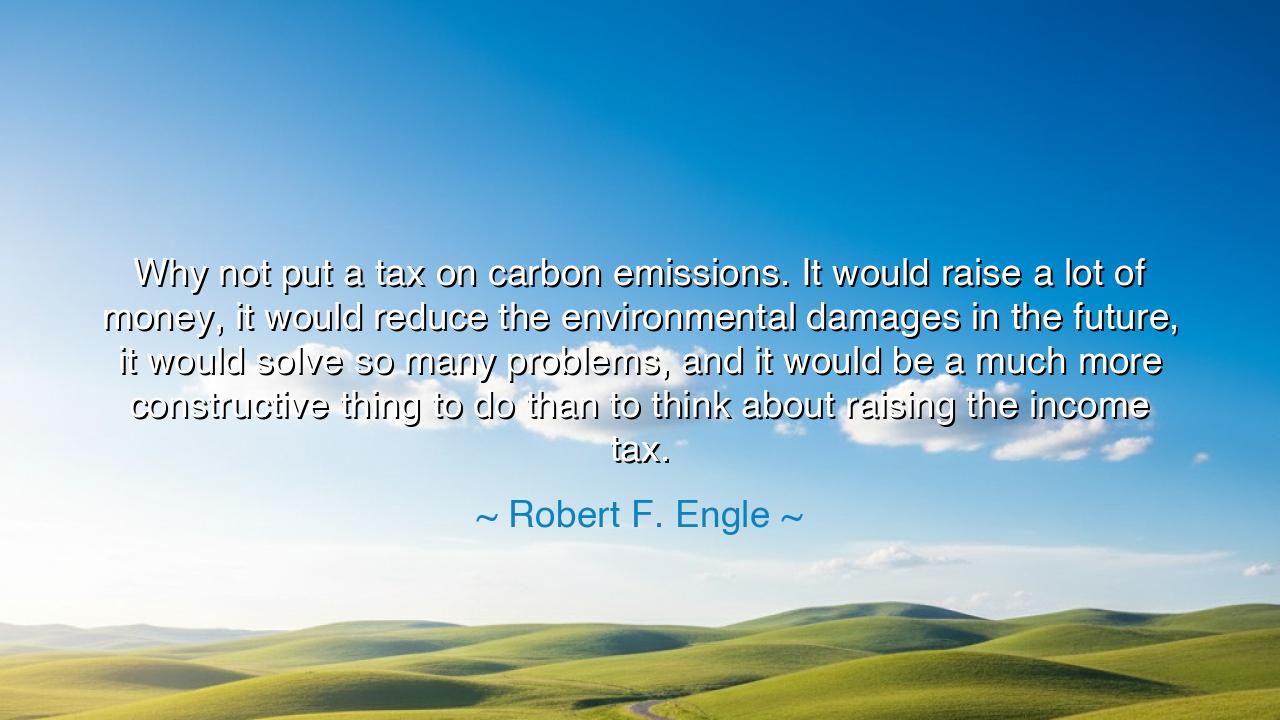
Why not put a tax on carbon emissions. It would raise a lot of
Why not put a tax on carbon emissions. It would raise a lot of money, it would reduce the environmental damages in the future, it would solve so many problems, and it would be a much more constructive thing to do than to think about raising the income tax.






Hear the words of Robert F. Engle, Nobel laureate and wise observer of the world’s economies, who declared: “Why not put a tax on carbon emissions. It would raise a lot of money, it would reduce the environmental damages in the future, it would solve so many problems, and it would be a much more constructive thing to do than to think about raising the income tax.” These words are not spoken lightly, but with the gravity of one who has measured risk and cost, and who knows that true wealth is not merely numbers in ledgers but the health of the earth itself.
The origin of this saying lies in Engle’s reflections on climate change and financial stability. As a scholar of risk and volatility, he saw clearly that the greatest unseen liability of all is the unchecked burning of carbon. For every ton of coal or barrel of oil consumed, the bill comes later—in storms, in floods, in droughts, in fires. Yet no ledger records this debt, and no market forces its payment. By placing a tax on carbon, Engle argued, society would make the hidden visible, charging the polluter for the harm caused, and directing resources toward renewal and protection.
History provides us with examples of such wisdom. Consider how in the 19th century, the cities of London and New York were choked with filth because sewage and waste were dumped freely into rivers. The cost of this neglect came in disease and death. Only when governments required investment in sanitation, charging fees and building systems, did the great cities become livable again. What seemed at first a burden proved to be a blessing, for it brought health, growth, and dignity. So too with the carbon tax—it may seem a burden at first, but its fruit is a world protected from far greater costs.
Engle contrasts this with the income tax, which takes from human labor and discourages productivity. To raise it is to place heavier weights upon the worker’s back. But to tax carbon emissions is different: it discourages destruction, not creation; it penalizes waste, not work. Such a tax guides society toward cleaner energy, innovation in technology, and stewardship of resources, while at the same time raising funds for the common good. It is, as Engle says, “constructive,” because it solves multiple problems at once—funding governments, protecting the earth, and encouraging wiser choices.
The deeper meaning of his words is that taxation must align with morality. Too often, the systems of finance are blind, punishing the industrious while rewarding the careless. But when taxation strikes at the true sources of harm, it becomes not only an instrument of revenue but of justice. The smoke that rises from the chimneys of factories should not go free into the sky, leaving the poor and the future to pay its price. To tax such smoke is to acknowledge the responsibility of the present to the unborn.
The lesson for us is clear: we must not think of taxes only as a burden, but as a tool. A carbon tax is a tool that aligns economy with ecology, making the invisible visible, and transforming greed into responsibility. If such a policy is resisted, it is often because those who profit from destruction wish to keep their costs hidden. Yet history shows that every great society prospers when it has the courage to confront hidden costs and bring them into the light.
And what shall we do in our daily lives? We must support leaders and policies that price pollution fairly. We must recognize that cheap goods built on destruction are no true bargain, for the bill will come later, and it will be paid in suffering. We can advocate for taxes that guide behavior toward sustainability, even as we take steps ourselves to reduce our own emissions. And we must teach our children that true wealth lies not in hoarded money, but in clean skies, fertile soil, and stable climates.
So remember the wisdom of Robert F. Engle: to place a tax on carbon emissions is not folly but foresight. It is the art of transforming a looming disaster into an opportunity for justice and renewal. Let us embrace such vision, that our economies may not only grow, but endure, and that our children may inherit not debts of ruin, but the riches of a living earth.






AAdministratorAdministrator
Welcome, honored guests. Please leave a comment, we will respond soon